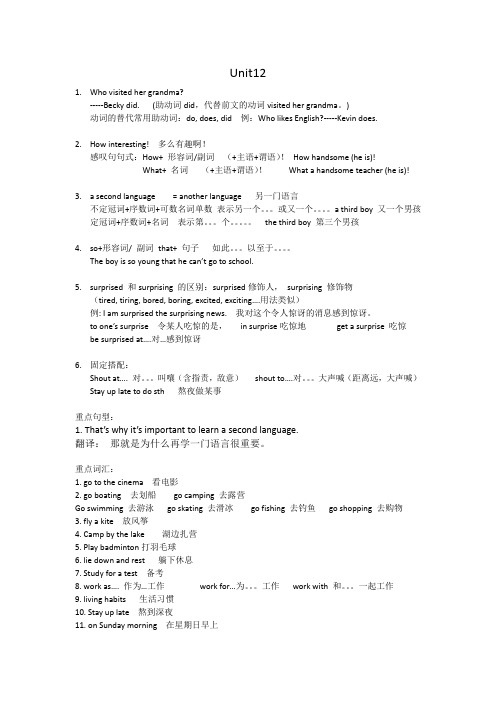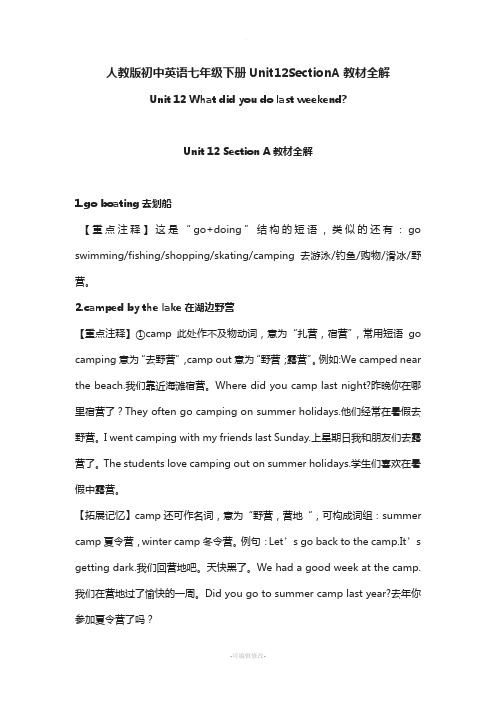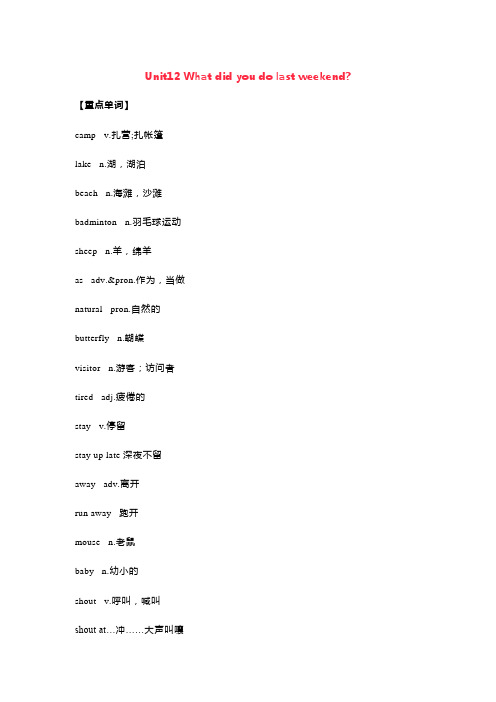人教版七年级下册英语Unit12知识点
- 格式:doc
- 大小:19.99 KB
- 文档页数:3

人教版七年级下册英语期末复习:Unit 7-Unit 12 各单元语法知识点复习提纲Unit 7 It’s raining!一、考点1 重点词汇短语1 messagemessage为可数名词,意为“消息,信息”,take a message for sb.“为某人捎个口信”。
拓展:give sb. a message 捎信给某人,leave a message 留口信,get the message 明白对方的意思。
Can I take a message for him?当某人发现要找的人不在或接电话的人发现打电话者要找的人不在时,常用此语2 could 情态动词意为“能,可以“,表示请求许可,在语气上比can委婉客气,但这种句式的肯定回答用can。
Could you just tell him to call me back?3 call及物动词,意为“打电话给”。
call sb. (up) “打电话给某人”,call sb. at +电话号码,意为“拨打……找某人”。
拓展:call 是一个多义词,call sb 可表示“叫醒某人,呼唤某人”;give sb. a call 给某人打电话。
4 back副词“回来,回原处,向后”;call sb. back给某人回个电话。
【即学即练】I’ll _____you _____.我将给你回电话。
5 visit此处用作及物动词,意为“拜访,探望”,后接表示人的名词或代词。
visit还可意为“参观,游览”,后接表示地点的名词。
拓展:visit还可用作可数名词,意为“访问,参观,拜访。
be on a visit to ... “正在访问/参观……”。
visitor参观者,游览者,游客。
I’m having a great time visiting my aunt in Canada._____ my grandparents every year at Christmas.我每年圣诞节都去探望我的祖父母。

最新人教版七年级英语下册单元知识归纳Unit12Unit 12 What did you do last weekend?重点清单1.do one's homework 做家庭作业2.go to the cinema 去看电影3.go boating 去划船4.camp by the lake 在湖边露营5.go to the beach 去海边6.play badminton 打羽毛球7.living habits 生活习惯8.have a good weekend 度一个好周末9.stay up 熬夜10.two weeks ago 两个星期前11.go camping 去露营12.put up 穿(戴)上13 make a fire 生火14.each other 相互15.get a surprise 吃惊16.look out of 朝外看17.shout to ... 对 ... 大喊18.start to do sth. 开始做某事19.up and down 到处20.wake ... up 叫醒 .......21.1stayed up late to watch the soccer game・我熬夜看足球比赛。
22.1worked as a guide at the Natural History Museum.我在自然历史博物馆当导游。
23.They have a butterfly house with over 200kinds of butterflies.他们有一个蝴蝶屋,里面有200多种蝴蝶。
24.There we put up our tents and made a fire to keep us warm and cook food on.在那我们支起一个帐篷,并生火取暖,在火上烹饪食物。
25.1was so tired that I went to sleep early.我太累了,因此很早就去睡觉了。

Unit121.Who visited her grandma?-----Becky did. (助动词did,代替前文的动词visited her grandma。
)动词的替代常用助动词:do, does, did 例:Who likes English?-----Kevin does.2.How interesting! 多么有趣啊!感叹句句式:How+ 形容词/副词(+主语+谓语)!How handsome (he is)!What+ 名词(+主语+谓语)!What a handsome teacher (he is)!3. a second language = another language 另一门语言不定冠词+序数词+可数名词单数表示另一个。
或又一个。
a third boy 又一个男孩定冠词+序数词+名词表示第。
个。
the third boy 第三个男孩4.so+形容词/ 副词that+ 句子如此。
以至于。
The boy is so young that he can’t go to school.5.surprised 和surprising 的区别:surprised修饰人,surprising 修饰物(tired, tiring, bored, boring, excited, exciting….用法类似)例: I am surprised the surprising news. 我对这个令人惊讶的消息感到惊讶。
to one’s surprise 令某人吃惊的是,in surprise吃惊地get a surprise 吃惊be surprised at….对…感到惊讶6.固定搭配:Shout at…. 对。
叫嚷(含指责,敌意)shout to….对。
大声喊(距离远,大声喊)Stay up late to do sth 熬夜做某事重点句型:1. That’s why it’s important to learn a second language.翻译:那就是为什么再学一门语言很重要。

人教版初中英语七年级下册Unit12SectionA教材全解Unit 12 What did you do last weekend?Unit 12 Section A教材全解1.go boating去划船【重点注释】这是“go+doing”结构的短语,类似的还有:go swimming/fishing/shopping/skating/camping去游泳/钓鱼/购物/滑冰/野营。
2.camped by the lake在湖边野营【重点注释】①camp此处作不及物动词,意为“扎营,宿营”,常用短语go camping意为“去野营”,camp out意为“野营;露营”。
例如:We camped near the beach.我们靠近海滩宿营。
Where did you camp last night?昨晚你在哪里宿营了?They often go camping on summer holidays.他们经常在暑假去野营。
I went camping with my friends last Sunday.上星期日我和朋友们去露营了。
The students love camping out on summer holidays.学生们喜欢在暑假中露营。
【拓展记忆】camp还可作名词,意为“野营,营地“,可构成词组:summer camp夏令营,winter camp冬令营。
例句:Let’s go back to the camp.It’s getting dark.我们回营地吧。
天快黑了。
We had a good week at the camp.我们在营地过了愉快的一周。
Did you go to summer camp last year?去年你参加夏令营了吗?②by the lake在湖边,by此处是介词,意为“在……旁边”、“在……近旁”、“在……手边”,此时要注意它与介词near有所不同,即by表示的距离更“近”。

Unit12 What did you do last weekend?【重点单词】camp v.扎营;扎帐篷lake n.湖,湖泊beach n.海滩,沙滩badminton n.羽毛球运动sheep n.羊,绵羊as adv.&pron.作为,当做natural pron.自然的butterfly n.蝴蝶visitor n.游客;访问者tired adj.疲倦的stay v.停留stay up late深夜不留away adv.离开run away 跑开mouse n.老鼠baby n.幼小的shout v.呼叫,喊叫shout at…冲……大声叫嚷woof v.(狗叫声)汪汪language n.语言fiy v.飞kite n.风筝fiy a kite 放风筝high adj.&adv高的(地)high school中学ago adv.以前India n.印度tent n.帐篷put up 搭起,举起moon n.月亮surprise n.&v.惊奇,惊讶get a surpris 吃惊snake n.蛇scared adj.惊慌的move v.移动shout to… 对……大声喊叫start v.开始,着手jump v.跳跃up and down 上上下下wake v.弄醒,醒into prep.到……里面forest n.森林ear n.耳朵【重点短语】1. last weekend 上周末2. do one’s homework 做作业3. go to the cinema 看电影4. go boating 去划船5. camp by the lake 在湖边露营6. go to the beach 去海滩7. play badminton 打羽毛球8. on Saturday morning 在周六的早上9. study for the English test 为了英语考试学习10. feed some cows 喂一些奶牛11. work as a guide 做为一个导游工作12. Natural History Museum 自然历史博物馆13. butterfly house 蝴蝶馆14. over 200 kinds of butterflies 超过200多种蝴蝶15. tell sb about … 告诉某人关于…16. living habits 生活习惯17. be kind of tired 有点儿累19. stay up 熬夜20. play with sb. 和某人玩21. lose things 丢东西22. run away 跑开23. fly a kite 放风筝24.as a special gift 作为一个特殊的礼物25. take sb. to sp. 把某人带到某地26. go camping 去露营27. put up the tents 搭建帐篷28. make a fire 生火29. keep sb. warm 使某人保持温暖30. on the first night 在第一天晚上31.so...that... 如此…以至于…32. go to sleep 去睡觉33. get a surprise 吃惊34. see sb. doing sth. 看见某人正在做某事35. jump up and down 上蹦下跳36. climb onto one’s back 爬到某人背上37. shout at/shout to 大声喊叫38 wake …up 把...弄醒39. move into… 移入,爬进…中40. a useful lesson 有用的一课【重点句型】1.—What did you do last weekend?Lucy?Lucy,你上周末做了什么?—Well, on Saturday, I played badminton.噢.周六我打羽毛球了。

1.camp[kæmp]o v. 扎营;搭帐篷o固定搭配:go camping 去野营,set up a camp 搭起帐篷o例句:We camped near the lake and had a barbecue. 我们在湖边扎营并烧烤。
ke [leɪk]o n. 湖;湖泊o固定搭配:by the lake 在湖边o例句:The view of the sunset over the lake was breathtaking.湖上的日落景色令人叹为观止。
3.beach [bi:tʃ]o n. 海滩;沙滩o固定搭配:on the beach 在海滩上o例句:We spent the afternoon relaxing on the beach. 我们下午在海滩上放松。
4.badminton['bædmɪntən]o n. 羽毛球运动o固定搭配:play badminton 打羽毛球o例句:I enjoy playing badminton in my free time. 我喜欢在空闲时间打羽毛球。
5.sheep [ʃi:p]o n. 羊;绵羊o固定搭配:a flock of sheep 一群羊o例句:The farmer counts his sheep every night before going to bed. 农夫每晚睡前都数羊。
6.as[æz]o prep.&adv. 作为;当作o固定搭配:as a result 结果,as if 好像o例句:He behaved as if he were the boss. 他表现得好像他是老板。
7.natural['nætʃərəl]o adj. 自然的o固定搭配:natural resources 自然资源o例句:She has a natural talent for music. 她有音乐天赋。
人教版英语七年级下Unit12单词、知识梳理、词汇句式精讲Unit12 What did you do last weekend?Unit12 单词(音标)camp [kæmp] v.扎营;搭帐篷lake [leɪk] n.湖;湖泊beach [biːtʃ] n.海滩;沙滩badminton [ˈbædmɪntən] n.羽毛球运动sheep [ʃiːp] n.羊;绵羊as [æz] prep.&adv.作为;当作natural ['nætʃərəl] adj.自然的butterfly [ˈbʌtəflaɪ] n.蝴蝶visitor ['vɪzɪtə] n.游客;访问者tired ['taɪəd] adj.疲倦的;疲劳的stay [steɪ] v.停留;待stay up late 深夜不留睡;熬夜away [ə'weɪ] adv.离开;远离run away ['rʌnəˌweɪ] 跑开mouse (pl. mice) 老鼠;耗子baby ['beɪbi] adj.&n.幼小的;婴儿shout [ʃaʊt] v.呼叫;喊叫shout at…冲……大声叫嚷woof int.(狗叫声)汪汪language ['læŋgwɪdʒ] n.语言fly (flew) v.飞kite [kaɪt] n.风筝fiy a kite 放风筝high [haɪ] adj.&adv.高的(地) high school 中学ago [ə'gəʊ] adv.以前India ['ɪndɪə] n.印度tent [tent] n.帐篷put up ['pʊtʌp] 搭起;举起moon [muːn] n.月亮surprise [sə'praɪz] n.&v.惊奇;惊讶;使吃惊get a surprise 吃惊snake [sneɪk] n.蛇scared [ /skeəd] adj.惊慌的;吓坏了的move [muːv] v.移动shout to…对……大声喊叫start [stɑːt] v.开始;着手jump [dʒʌmp] v.跳;跃up and down 上上下下;起伏wake (woke) v.弄醒;醒wake…up 把……弄醒into ['ɪntuː] prep.到……里面;进入forest [ˈfɒrɪst] n.森林ear [ɪə] n.耳朵Unit12 知识梳理【重点短语】1. last weekend 上周末2. do one’s homework 做作业3. go to the cinema 看电影4. go boating 去划船5. camp by the lake 在湖边露营6. go to the beach 去海滩7. play badminton 打羽毛球8. on Saturday morning 在周六的早上9. study for the English test 为了英语考试学习10. feed some cows 喂一些奶牛11. work as a guide 做为一个导游工作12. Natural History Museum 自然历史博物馆13. butterfly house 蝴蝶馆14. over 200 kinds ofbutterflies 超过200多种蝴蝶15. tell sb about …告诉某人关于…16. living habits 生活习惯17. be kind of tired 有点儿累19. stay up 熬夜20. play with sb. 和某人玩21. lose things 丢东西22. run away 跑开23. fly a kite 放风筝24.as a special gift 作为一个特殊的礼物25. take sb. to sp. 把某人带到某地26. go camping 去露营27. put up the tents 搭建帐篷28. make a fire 生火29. keep sb. warm 使某人保持温暖30. on the first night 在第一天晚上31.so...that... 如此…以至于…32. go to sleep 去睡觉33. get a surprise 吃惊34. see sb. doing sth. 看见某人正在做某事35. jump up and down 上蹦下跳36. climb onto one’s back 爬到某人背上37. shout at/shout to 大声喊叫38 wake …up 把...弄醒39. move into…移入,爬进…中40. a useful lesson 有用的一课【重点句型】1.---What did you do last weekend?你上周末做了什么?---Well, on Saturday, I played badminton.噢.周六我打羽毛球了。
精品文档Unit12名词:mouse 老鼠moon 月亮lake 湖;湖泊snake 蛇language 语言beach 海滩;沙滩forest 森林风筝羊;绵羊kite sheepvisitor 游客;访问者耳朵ear 印度India动词:jump 跳;跃camp 扎营;搭帐篷fly 飞弄醒;醒移动move wake stay 停留;待shout 开始;着手start 呼叫;喊叫形容词:惊慌的;吓坏了的scared natural 自然的疲倦的;疲劳的tired副词:away 离开;远离以前ago介词:as 作为;当作到……里面;进入into兼类词:使吃惊v 惊讶惊奇;n surprise n有效的baby abj 婴儿高的(地)adj&adv high 短语:stay up late high school 中学深夜不睡;熬夜up wake……把……弄醒put up 搭起;举起each other 互相;彼此跑开run away ……冲……大声叫嚷shout at吃惊get a surpriseshout to上上下下;起伏……对……大声喊叫up and downfly a kite 放风筝知识点:、1go camping 去野营camp out 露营do/does/did、2代替上文内容,避免重复精品文档.精品文档—Who visit her grandma?谁看望了她的奶奶?—Betty did. Betty看望了。
—Who break the window?谁打破了窗户?—Tim does. Tom打破的。
do/does/did取决于问句中的时态3、as + 名词作为……As a player, you should have a strong body. 作为一名运动员,你应该有一个强壮的身体。
She worked as a teacher in this school. 她曾在学校里当过老师。
人教版七年级下册英语Unit12单元语法知识点总结本单元重点短语的具体用法1. Last weekend:用于描述过去的时间,通常在句子中作时间状语。
例如:I went shopping last weekend.(我上周末去购物了。
)2. Do one's homework:表示做作业。
例如:I need to do my homework before going out.(我需要在出去之前做作业。
)3. Go to the cinema:去看电影。
例如:They decided to go to the cinema instead of staying at home.(他们决定去电影院而不是待在家里。
)4. Go boating:去划船。
例如:We went boating on the lake and had a great time.(我们在湖上划船,玩得很开心。
)5. Camp by the lake:在湖边露营。
例如:They camped by the lake and enjoyed the beautiful scenery.(他们在湖边露营,欣赏美丽的风景。
)6. Go to the beach:去海滩。
例如:I like to go to the beach to relax.(我喜欢去海滩放松。
)7. Play badminton:打羽毛球。
例如:They played badminton in the park.(他们在公园里打羽毛球。
)8. On Saturday morning:在周六的早上。
例如:On Saturday morning, I usually sleep in.(在周六的早上,我通常会睡懒觉。
)9. Study for the English test:为英语考试学习。
例如:I have to study for the English test tomorrow.(我必须为明天的英语考试学习。
七下Unit 12 What did you do last weekend?一、Important Phrases:1.go to the cinema 去影院★=go to the movies2.go boating/camping 去划船/野营★summer camp 夏令营3.camp by the lake 在湖边野营★by the pool在池边4.go to the beach 去海滩★on the beach 在沙滩上5.play badminton 打羽毛球play+球类/棋类名词(不加冠词)6. study for the test 备考★test=exam7.feed some sheep/cows喂羊/牛★feed(fed)on...以..为食,feed with...用...喂养8. work as a guide 做导游工作★work as +职业从事某工作9. at the Natural History Museum 自然历史博物馆★nature(n.不可数)大自然-natural(adj.)自然的10. over 200 kinds of butterflies 200多种蝴蝶★over=more than 超过11.living habits 生活习惯★make a living 谋生;eating habits饮食习惯12.kind of tired 有点累★kind of = a little13. stay up late 熬夜★stay at home 待在家,stay away from 远离,lately(adv.)最近地14.sleep early 早睡★sleepy 困的,asleep睡着的15.a family of mice 老鼠一家★mouse(单)-mice(复)16.be afraid of sth./to do 害怕★afraid=scared17.run away 跑开★take away 带走,put...away 把某物收拾好,give away 捐赠18. climb onto one’s back 爬上某人的背19. shout at/to sb.冲某人大叫★shout out 大喊出20. a second language 第二语言★mother tongue 母语21.fly a kite放风筝22.do something interesting 做有趣的事★修饰不定代词,adj.后置:anything special23.finish high school 中学毕业★finish doing sth 完成做某事24.a special gift一特殊礼物★gift=present25.take us to India 带我们去印度26.take a long bus ride 坐很久的公交车27.put up our tents 搭帐篷★put up:搭建,举起,张贴28.make a fire生火29.cook food on the fire 在火上做饭★on an open fire 明火,篝火30.tell cach other stories 互相讲故事★tell a lie 说谎,tell a joke 讲笑话31.keep sb.warm 使某人保持暖和32.sit under the moon 坐在月光下★moonlight月光,moon cake月饼33.so.......that.......如此...以致于...34.get a surprise 吃惊35. look out of...向外看★look out 小心,look for寻找,look after 照顾36. jump up and down 跳上跳下37. move into the forest 进入森林38. wake sb up叫醒某人★wake up醒来,awake醒着的39. read a book about history 读一本历史书★read...to sb给某人读...40.see an interesting talk show 看有趣的脱口秀二、Key Language Points:1.Where did you go last weekend? What did you do last weekend?上周末你去了哪里?上周末你做了什么?一般过去时的特殊疑问句:1)特殊疑问词+did+主语+v.(原)+其他?如疑问词作主语,则陈述语序,如:Who bought you this new dress?谁给你买的新裙子?2)特殊疑问词+was/were+主语+其他?Where were you last night?昨晚你在哪里?2.----Who visited her grandma? -----Becky did.为避免重复,常用do,does,did,so等代替前文提到的内容。
Unit12 名词:
lake 湖;湖泊
beach 海滩;沙滩sheep 羊;绵羊
visitor 游客;访问者mouse 老鼠
language 语言
kite 风筝
India 印度
moon 月亮
snake 蛇
forest 森林
ear 耳朵
动词:
camp 扎营;搭帐篷stay 停留;待shout 呼叫;喊叫fly 飞
move 移动
start 开始;着手
jump 跳;跃
wake 弄醒;醒
形容词:
natural 自然的tired 疲倦的;疲劳的scared 惊慌的;吓坏了的副词:
away 离开;远离ago 以前
介词:
as 作为;当作into 到……里面;进入
兼类词:
baby abj有效的 n婴儿high adj&adv 高的(地)surprise n惊奇;惊讶 v使吃惊
短语:
stay up late 深夜不睡;熬夜wake……up 把……弄醒
run away 跑开
shout at……冲……大声叫嚷shout to……对……大声喊叫fly a kite 放风筝high school 中学
put up 搭起;举起
each other 互相;彼此
get a surprise 吃惊
up and down 上上下下;起伏
知识点:
1、 go camping 去野营
camp out 露营
2、do/does/did代替上文内容,避免重复
—Who visit her grandma?谁看望了她的奶奶?—Betty did. Betty看望了。
—Who break the window?谁打破了窗户?—Tim does. Tom打破的。
do/does/did取决于问句中的时态
3、as + 名词作为……
As a player, you should have a strong body. 作为一名运动员,你应该有一个强壮的身体。
She worked as a teacher in this school. 她曾在学校里当过老师。
4、(1)how引导的感叹句
How + 形容词或副词(+ 主语 + 谓语)!多么……啊!
How happy they look!他们看起来多么高兴啊!
How hard he is working!他工作地多么努力啊!
(2)what引导的感叹句
① What + a/an + 形容词 + 可数名词单数(+ 主语 + 谓语)!多么……啊!What a clever boy(he is)!他是多么聪明的一个小男孩啊!
② What + 形容词 + 可数名词复数(+ 主语 + 谓语)!多么……啊!
What beautiful flowers!多么漂亮的花啊!
5、 be tired of(doing)sth 厌烦(做)某事
She is tired of this excuse. 她厌烦了这个借口。
She is tired of playing the violin. 她厌烦了拉小提琴。
6、 shout out 大声说
shout at 冲……大喊,生气愤怒
shout to 对……大喊,距离远
She shout out for help. 她大声呼救。
David is angry and he shouts at Tim. David很生气,冲着Tim大喊。
Mary shouted to us to help her. Mary大声喊我们帮助她。
7、 to one's surprise 让某人惊讶的是
in surprise 惊奇地;惊讶地
get a surprise 吃惊
To my surprise, he didn't pass the exam. 让我惊讶的是,他没有通过考试。
They look at each other in surprise. 他们惊讶地看着对方。
I got a surprise when I saw the bill. 一看账单我吃了一惊。
8、 be scared of sth害怕某物
be scared to do sth 害怕做某事
I am scared of snakes. 我害怕蛇。
She is scared to climb the tree. 她害怕爬树。
9、move to + 地点搬到/移到某地
He wants to move to countryside. 他想搬到乡下。
10、 start/begin to do sth 开始做某事
to start with第一;首先 = first of all
She starts to clean the room at 8:00. 她在8点开始打扫房间。
To start with, you should open the door. 首先,你应该打开门。
11、一般过去时知识点见具体讲义
1.We went to the b and swam in the sea last summer.
2.Tom can speak three l . They are Chinese, English and French.
3.When I heard the news, I got a great s .
4.Tigers and monkeys like to live in the f .
5.The m and the sun both rise in the east and go down in the west.
6.The baby (wake)up and began to cry.
7.How many (sheep)can you see on the farm?
8.It is (nature)for parents to worry about their children.
9.The mountain is too . I think I can't climb it up.
10.Please your hands before you answer the teacher's question in class.
11. weather!It's raining!
12.It's not polite(礼貌的)to (大声喊)your parents.
13.Don't late, or you will feel tired next day.
14.Some girls (害怕老鼠).
15.Tom (跑开)quickly.
16.We (扎营)by the river last night.
17.—Who cleaned the room?—Peter .
18.(作为)a student, you should study hard.
19.I'm t after studying all day.
20.A kangaroo can (跳)high.
21.Don't (待)too long at the party.
22.He (开始)to write novel at the age of 20.
23.Tom is scared of (蛇).
24.The children are jumping (上上下下)in the room.。